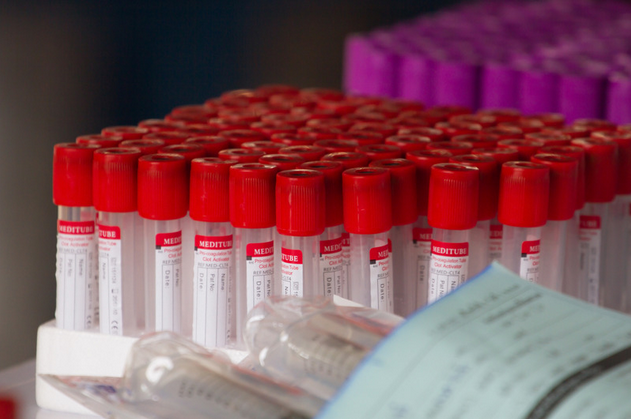

Veterinary Review Initiative
This resource has been reviewed for accuracy and clarity by a qualified Doctor of Veterinary Medicine as of January 2023.
Check out more information on our Veterinary Review Initiative here!
Whether you work in sanctuary spaces or simply follow animal rescuesOrganizations that help secure animals from dangerous or unacceptable situations. As organizations, rescues may or may not have dedicated permanent infrastructure for housing animals. online, you’ve likely come across the phrase “blood work” when discussing animal care. New rescue? Run some blood work. Sanctuary resident not acting like themself? Ask for blood work. Trying to stay on top of health conditions that may pop up with age? Check their blood work. The concept of “blood work” comes up often, but what exactly do folks mean? There are many, many different blood tests that may be appropriate in different species and in different circumstances. In this resource we’re going to focus on the two that tend to come up most frequently – the complete blood count and blood chemistry panel.
Before we dive in, it’s important to stress that while blood testing can play an important role in monitoring health and diagnosing disease, it is just one piece of the puzzle. Different situations are going to require a different set of tools, which may include different blood tests than those described below or other diagnostic tools entirely. The person best equipped to identify the most appropriate combination of tools for each specific case will be your veterinarian. Veterinarians comprehensively look at many factors (environment, age, breed, species, physical exam, diet, diagnostic tests) to make recommendations and treatment plans.
This Resource Is NOT A Replacement For A Veterinarian’s Professional Knowledge And Experience!
While it may be tempting to try to interpret blood work simply by comparing the results to normal reference intervals, interpreting blood work is more nuanced than just seeing which levels are out of the normal range. Because of this, you should always work with an experienced veterinarian to have blood work results interpreted. Interpreting blood work involves understanding the relationship between different analytes (the substances or cells of interest during analysis) and what causes the various analytes to fall outside of normal reference intervals. It also requires the knowledge and experience necessary to interpret results in conjunction with the individual’s clinical signs, taking into account any external factors that could have impacted the results (such as stress from handling or the length of time a blood sample was sitting before being tested). Even for tests that offer a seemingly simple “positive” or “negative” result, it’s important to work with an experienced veterinarian who can help you make sense of the result, which may not be as simple as a positive meaning that an individual has the disease in question or a negative meaning that they definitely do not. The purpose of this resource is to provide an overview of blood work as a veterinary diagnostic tool, not to teach anyone how to interpret diagnostic results.
What Is A Complete Blood Count?
A complete blood count, or CBC for short, gives your veterinarian information about the individual’s blood cells, analyzing the quantity and appearance of red blood cells, white blood cells, and platelets. This information (often combined with a physical examination and other diagnostic tools) can play an important role in the diagnosis and/or monitoring of infection and disease. CBC results might reveal (or confirm) anemiaAnemia is a condition in which you don't have enough healthy red blood cells to carry adequate oxygen to the body's tissues., dehydration, infection, or inflammation, among other things.
What Is A Blood Chemistry Panel?
A blood chemistry panel (sometimes also called a chemistry profile) is actually made up of multiple tests that measure various substances in the blood, such as protein and glucose, as well as important enzymes, electrolytes, and minerals, though the specific analytes included in a chemistry panel will vary by species and also by lab. Blood chemistry results give your veterinarian an idea of an individual’s overall health and provide information about various body systems and organs, including the health and function of the kidneys, liver, and pancreas. A chemistry panel may be recommended for apparently healthy residents in order to screen for underlying disease or may be recommended to get a better idea of what is going on with someone who is ill. A chemistry panel can also be useful in monitoring disease progression and/or an individual’s response to certain treatments (including checking for adverse effects).
What About Other Tests?
There are far more blood tests than just the CBC and chemistry, and there may be specific tests that are regularly performed on your residents. This may include:
- Testing certain vitamin or mineral levels, such as monitoring your cow residents’ selenium levels (blood testing is not the best tool to assess all vitamins and minerals, so be sure to work closely with your veterinarian to determine if blood testing is appropriate for the vitamin or mineral in question)
- Testing for heavy metal exposure, such as in the case of a chicken showing signs of heavy metal toxicity
- Screening for specific diseases in new arrivals, even if they are not showing signs of illness, such as testing all new goat residents for small ruminant lentiviruses (SRLV)
- Testing for specific diseases in individuals who are showing signs of illness, such as testing for aspergillosis in a duckUnless explicitly mentioned, we are referring to domesticated duck breeds, not wild ducks, who may have unique needs not covered by this resource. resident showing signs of respiratory disease
There may also be times when certain parts of a CBC or blood chemistry panel are recommended. For example, if a sheep is showing signs of a barber pole worm infection, your veterinarian may recommend checking hematocrit and total protein levels rather than (or before) running a full CBC and chemistry. (As a side note, with proper training and equipment, these tests can be performed onsite and offer almost immediate information that you can then share with your veterinarian, but we recommend having a conversation with your veterinarian about what makes the most sense for your sanctuary.)
Bottom line: Just as you should rely on an experienced veterinarian when it comes to interpreting blood test results, you should also defer to them (or at least rely heavily on them) when it comes to determining the most appropriate tests for your residents. Even if you know you want all of your residents screened for a specific disease, for example, it’s important to work with your veterinarian to determine the best way to go about this. There may be more than one test available with one being most appropriate for use in an individual who is not showing signs of disease and another that is best to use when disease is suspected. There are also situations where it’s best to use a combination of diagnostic tools. An experienced veterinarian is going to be your best resource when it comes to putting together a diagnostic plan.
When discussing which diagnostic tools to use, keep in mind that some diseases are notifiable and a positive result could have serious implications for the individual being tested, residents they’ve come into contact with, and even your sanctuary as a whole. It’s a good idea to make sure you fully understand the benefit of testing as well as any potential risks.
Can I Collect And Submit Blood Samples Myself?
We already stressed the importance of having a veterinarian involved in both determining which tests to perform and having results interpreted, but you may be wondering if they also have to be involved in the collection and submission of samples, especially if you know how to draw blood. First, be aware that some tests may require that a licensed veterinarian collect the sample and that regulations regarding who can draw blood may vary by jurisdiction. If you are permitted to collect blood samples (based on the test and your jurisdiction), we strongly encourage you to have a conversation with your veterinarian about this prospect. Not only do you need to determine if and when it is appropriate, you also want to ensure you maintain a good relationship with your veterinarian. A veterinarian may not appreciate being asked to interpret diagnostic results if they were not involved at all in the submission process and have no real working relationship with you or your organization.
If, after a conversation with your veterinarian, it is decided that you or your staff will collect blood samples on occasion, make sure to come up with a plan that you are both happy with that ensures they are kept informed about what is going on and are involved in coming up with the most appropriate diagnostic plan. As we mentioned earlier, blood testing is just one diagnostic tool among many. In some situations, your veterinarian may need to perform a physical examination before they can make recommendations about diagnostics or before they feel comfortable interpreting results. However, if you have a good working relationship with your veterinarian, there may be times when they recommend the immediate collection and submission of blood samples for specific tests that they recommend, particularly if they are unable to see the individual right away. A lot is going to depend on the situation and your relationship with your vet, so be sure to have a conversation with them so you know how to best proceed.
If you or your staff plan to do blood draws, we also recommend working with your veterinarian to ensure that everyone collecting blood samples is properly trained in terms of 1) how to draw blood, 2) the specimen requirements for requested tests, 3) how samples should be stored, and 4) how quickly those samples need to be submitted. Improper technique or storage, as well as waiting too long to submit samples to the lab can negatively impact results, ultimately wasting both time and money if samples must be resubmitted.
Even if you and your veterinarian determine that it is reasonable for you or your staff to collect blood samples, when working with veterinary diagnostic laboratories (versus tests run in your veterinarian’s clinic), your veterinarian may need to sign off on the submission of such samples.
Don’t Forget To Take Good Notes And Keep Accurate Records
We recommend always asking your veterinarian for a copy of diagnostic results so that you can include them in your residents’ records. It’s also important to take thorough notes about their interpretation of those results. If your veterinarian provides their interpretation in writing, simply print this out and file it along with the results. If they offer their interpretation in person or over the phone, be sure to take good notes so that this information is not lost. Regardless of how they provide their interpretation, be sure to ask questions if you don’t understand something.

Blood testing can play an important role in monitoring resident health and diagnosing disease, but it’s imperative that you have a good relationship with an experienced veterinarian so that you can make the most of this diagnostic tool. While we hope this resource has given you a basic understanding of how this tool is used, your veterinarian is going to be your best resource when it comes to assessing your residents’ health, recommending the most appropriate diagnostics, and making sense of results.
SOURCES:
Hematology | Cornell University College Of Veterinary Medicine eClin Path
Chemistry | Cornell University College Of Veterinary Medicine eClin Path
Exotics | Cornell University College Of Veterinary Medicine eClin Path
Fundamentals Of Veterinary Clinical Pathology, 2nd Edition | Steven L. Stockham and Michael A. Scott






